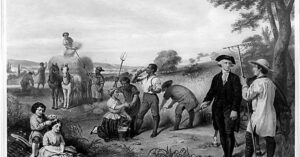A recent front page story from the Washington Post read:
A White man shot a 16-year-old Black boy who knocked on his front door because he was “scared to death.”
“When 16-year-old Ralph Yarl rang the doorbell of Andrew Lester’s Kansas City, Mo., home by mistake last week, the 84-year-old White man was “scared to death,” he told police. The Black teenager was looking for his two siblings who were playing at a friend’s house. Instead, he arrived at Lester’s door — one block off course. No words were exchanged, Lester told police, before he lifted his .32-caliber revolver and shot through a glass door at Yarl, hitting him in the head and arm.”
Like many of you I was stunned by this story. How could this young lad engender such fear?
Was is because he was Black?
Apparently.
An echo of the Original Sin of the American republic?
Apparently.
Question one: How can we can truly call ourselves a nation “under God” when such racial malice is so prevalent?
Question two: How did we get here?
Maybe the answer to both questions can be found in the mythical belief of many that the republic was founded by an act of divine providence and the constitution was an inspired text ordained by God. (A text which just happens to ascribe to Black people the humanity of three-fifths of a person.)
How do you ever overcome a number like that?
But that’s just the truth — and sometimes the truth can feel like a bite in the ass.
I’m reading The American Dialogue: The Founders and Us, by Joseph Ellis, and I’ve been bitten a time or two.
For instance, he describes one paradoxical scene when Thomas Jefferson arrives in Philadelphia in 1775 to take his seat at the Continental Congress.
“This man who was soon to draft the the most succinct statement about human equality in modern history dismounted from his orange carriage accompanied by Jesse, Juniper and Richard, three formally attired slaves.
If the central contradiction of American history is the coexistence of individual freedom and slavery, Jefferson lived both sides of the contradiction more conspicuously than any of the American founders.”
The author of the Declaration of Independence penned this observation:
“Nothing is more certainly written in the book of fate than that these people are to be free. Nor is it less certain that the two races, equally free, cannot live in the same government. Nature, habit, opinion has drawn the indelible lines of distinction between them.”
Here Jefferson, the most eloquent apostle of freedom, revealed himself to be an ardent racist.

But he was not alone in that opinion. A majority of the founding fathers agreed with him.
An exception was John Adams, who wrote, “Negro slavery is an evil of colossal magnitude.”
Our actual history sheds light on how this original sin was woven into the very character of the nation.
No one experienced the effects of this handiwork any more than Abraham Lincoln, as he was charged with leading the nation in a war to clean up the mess created at its inception.
In his Second Inaugural Address he observed it was God rendering a bloody but righteous judgement on the nation:
“The will of God prevails—In great contests each party claims to act in accordance with the will of God. Both may be, and one must be wrong. God cannot be for, and against the same thing at the same time…every drop of blood drawn with the lash shall be paid by another drawn with the sword…'”
So what does this all mean for us today?
Perhaps that we live according to the principles we claim to believe: that ALL people are created equal, that we are ONE nation under God.
Lincoln offers the only lasting remedy:
“With malice toward none, with charity for all, with firmness in the right as God gives us to see the right, let us strive on to finish the work we are in, to bind up the nation’s wounds…to do all which may achieve and cherish a just and lasting peace.”
Maybe then, a 16-year-old boy can show up at your door and be greeted with a smile instead of a gun.
Just a thought…
Pat
Copyright © 2023 Patrick J. Moriarty. All Rights Reserved.
Would you like to submit a post to Just A Thought? To learn more, please click here.



